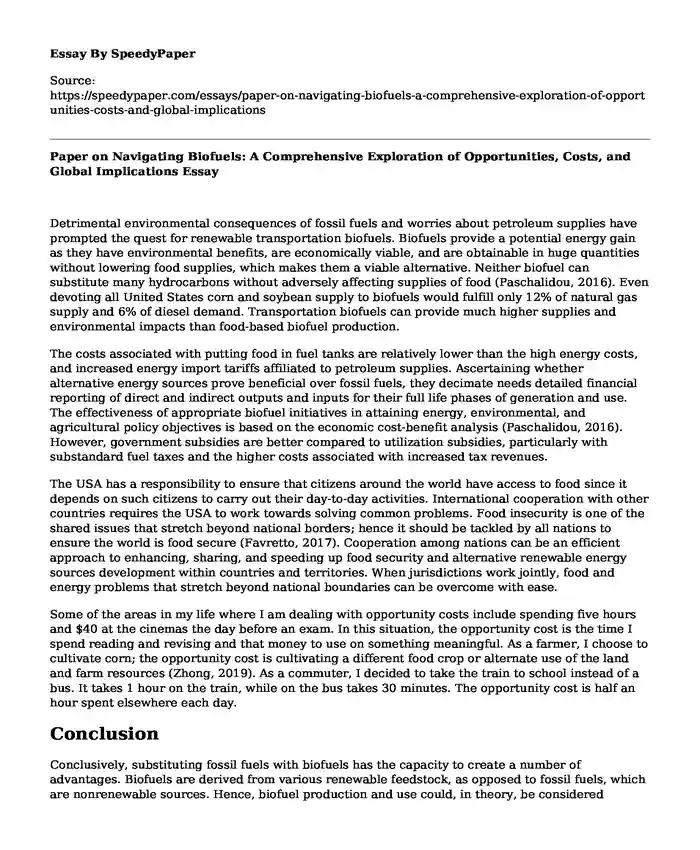Detrimental environmental consequences of fossil fuels and worries about petroleum supplies have prompted the quest for renewable transportation biofuels. Biofuels provide a potential energy gain as they have environmental benefits, are economically viable, and are obtainable in huge quantities without lowering food supplies, which makes them a viable alternative. Neither biofuel can substitute many hydrocarbons without adversely affecting supplies of food (Paschalidou, 2016). Even devoting all United States corn and soybean supply to biofuels would fulfill only 12% of natural gas supply and 6% of diesel demand. Transportation biofuels can provide much higher supplies and environmental impacts than food-based biofuel production.
The costs associated with putting food in fuel tanks are relatively lower than the high energy costs, and increased energy import tariffs affiliated to petroleum supplies. Ascertaining whether alternative energy sources prove beneficial over fossil fuels, they decimate needs detailed financial reporting of direct and indirect outputs and inputs for their full life phases of generation and use. The effectiveness of appropriate biofuel initiatives in attaining energy, environmental, and agricultural policy objectives is based on the economic cost-benefit analysis (Paschalidou, 2016). However, government subsidies are better compared to utilization subsidies, particularly with substandard fuel taxes and the higher costs associated with increased tax revenues.
The USA has a responsibility to ensure that citizens around the world have access to food since it depends on such citizens to carry out their day-to-day activities. International cooperation with other countries requires the USA to work towards solving common problems. Food insecurity is one of the shared issues that stretch beyond national borders; hence it should be tackled by all nations to ensure the world is food secure (Favretto, 2017). Cooperation among nations can be an efficient approach to enhancing, sharing, and speeding up food security and alternative renewable energy sources development within countries and territories. When jurisdictions work jointly, food and energy problems that stretch beyond national boundaries can be overcome with ease.
Some of the areas in my life where I am dealing with opportunity costs include spending five hours and $40 at the cinemas the day before an exam. In this situation, the opportunity cost is the time I spend reading and revising and that money to use on something meaningful. As a farmer, I choose to cultivate corn; the opportunity cost is cultivating a different food crop or alternate use of the land and farm resources (Zhong, 2019). As a commuter, I decided to take the train to school instead of a bus. It takes 1 hour on the train, while on the bus takes 30 minutes. The opportunity cost is half an hour spent elsewhere each day.
Conclusion
Conclusively, substituting fossil fuels with biofuels has the capacity to create a number of advantages. Biofuels are derived from various renewable feedstock, as opposed to fossil fuels, which are nonrenewable sources. Hence, biofuel production and use could, in theory, be considered successful and sustainable. Opportunity cost comes into play in a situation where there is a dilemma in generating energy or food using agricultural products. It requires tough choices to determine, which serves the interests of people the best. Also, there is a need to use the production curves to ensure that a thorough economic analysis is done while considering the best alternative for producing biofuels and food from agricultural products.
References
Favretto, N., Stringer, L. C., Buckeridge, M. S., & Afionis, S. (2017). Policy and diplomacy in the production of second-generation ethanol in Brazil: International relations with the EU, the USA and Africa. In Advances of Basic Science for Second Generation Bioethanol from Sugarcane (pp. 197-212). Springer, Cham.
Paschalidou, A., Tsatiris, M., & Kitikidou, K. (2016). Energy crops for biofuel production or for food?-SWOT analysis (case study: Greece). Renewable Energy, 93, 636-647.
Zhong, Z., Li, X., Liu, X., & Lau, W. (2019). Opportunity cost management in project portfolio selection with divisibility. Journal of the Operational Research Society, 70(7), 1164-1178.
Cite this page
Paper on Navigating Biofuels: A Comprehensive Exploration of Opportunities, Costs, and Global Implications. (2023, Dec 03). Retrieved from https://speedypaper.net/essays/paper-on-navigating-biofuels-a-comprehensive-exploration-of-opportunities-costs-and-global-implications
Request Removal
If you are the original author of this essay and no longer wish to have it published on the SpeedyPaper website, please click below to request its removal:
- Free Essay Sample: Comprehensive Risk Assessment of Water Shortage
- Essay Example: The Causes of Environmental Pollution
- Reading Landscape Reflection Paper, Free Example
- Essay Sample on Analysis on the Effects of Population Growth
- Paper Example. Response to Questions on the Dust Blow
- OCBC Bank: Pioneers in Employee Talent Management & Development - Paper Example
- Essay Sample on New Zealand's Natural Product Industry
Popular categories





